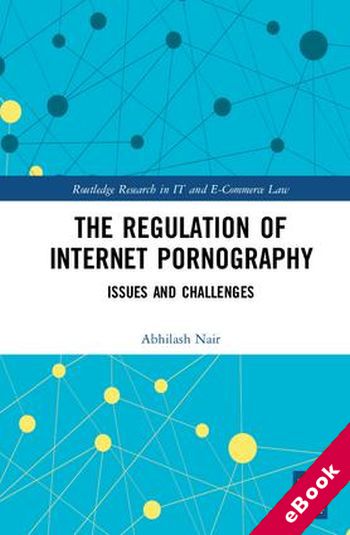We are now closed for the Christmas and New Year period, returning on Monday 5th January 2026. Orders placed during this time will be processed upon our return on 5th January.

The device(s) you use to access the eBook content must be authorized with an Adobe ID before you download the product otherwise it will fail to register correctly.
For further information see https://www.wildy.com/ebook-formats
Once the order is confirmed an automated e-mail will be sent to you to allow you to download the eBook.
All eBooks are supplied firm sale and cannot be returned. If you believe there is a fault with your eBook then contact us on ebooks@wildy.com and we will help in resolving the issue. This does not affect your statutory rights.
The regulation of pornography has always been a contentious issue, and has sparked wide ranging debates in relation to its regulation and control.
However, the use of the internet to distribute and access pornography has magnified this debate due to the global nature of the internet and the variety and scale of legal and illegal pornography available. This has resulted in a range of regulatory responses in different countries, including the U.K.
Whilst no internet specific sui generis legislation for regulating pornography was enacted in the UK, a number of amendments were made to existing legislation, which created new simple possession offences for child pornography, including pseudo and virtual child pornography, and adult extreme pornography.
These possession offences impose liability on the end-user consumer of pornography, marking a departure from the traditional regulatory model which focused on the publisher and distributor of pornography.
This book provides an in-depth analysis of the legal issues stemming from this relatively new regulatory model in the context of the various kinds of pornography including adult legal pornography, illegal adult extreme pornography, and virtual and pseudo child pornography.
The book includes a comparative study of the relevant position in other jurisdictions, most notably the United States and continental Europe. The book will analyse the legal implications of the changes in regulation and examine how the traditional justifications for censorship and proportionality apply, if at all, to the new model. Key issues surrounding the regulation of internet pornography are highlighted including alternatives to possession offences where applicable, the risk of over-blocking, relevant constitutional and human rights implications, the feasibility of an internet specific regulatory model, and the potential role of the Internet Governance Forum and other supranational bodies.